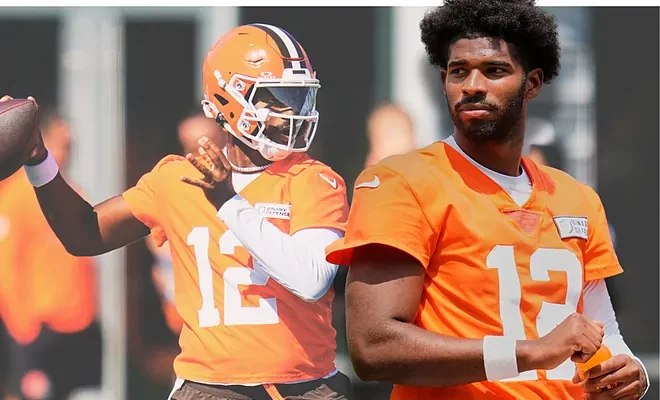The Cleveland Browns’ decision to name Shedeur Sanders as the starting quarterback in his NFL debut has ignited a firestorm of criticism, skepticism, and outright accusations of sabotage from large sections of the team’s fanbase. The move has not only raised eyebrows due to its shock value but has also rekindled longstanding fears within Browns nation about internal dysfunction, poor leadership decisions, and a lack of transparent football rationale in pivotal organizational moments. For a franchise long haunted by instability at the quarterback position, the choice to thrust a rookie into the spotlight, especially one without traditional NFL grooming, feels to many fans like the latest in a series of self-inflicted wounds.
Shedeur Sanders, the highly touted quarterback out of Colorado and son of Pro Football Hall of Famer Deion Sanders, arrived in Cleveland amid swirling media attention and lofty expectations. His college resume was impressive, filled with moments of poise, accuracy, and leadership. Still, even the most ardent Sanders supporters expected a transition period. The Browns, who have spent years attempting to solidify the quarterback position after decades of inconsistency, surprised analysts and fans alike when they not only drafted Sanders but immediately handed him the keys to the offense in Week 1 of the regular season. It wasn’t just a vote of confidence—it was a full-scale gamble, and one that many believe was made for the wrong reasons.
The accusations of sabotage, while dramatic, are not entirely baseless in the eyes of critics. Many point to the fact that the Browns had other viable options on the roster—veteran quarterbacks with starting experience or at least the capability to ease Sanders into the brutal pace of the NFL. Instead, the coaching staff and front office appeared to bypass traditional developmental safeguards and accelerated Sanders’ timeline without public explanation. Fans on social media platforms, talk radio, and online forums have cited this as emblematic of a franchise more interested in headlines and hype than in methodical, strategic growth.
The shadow of ownership also looms large over this decision. There are whispers, both within local media and national circles, that Jimmy Haslam, the often-meddling Browns owner, may have played a role in pushing Sanders into the starting role prematurely. While there’s no official confirmation of Haslam’s involvement, the timing and nature of the announcement have the hallmarks of a top-down directive. The NFL is no stranger to owners influencing roster decisions, but in Cleveland—where ownership interference has been cited as a factor in past failures—the optics are particularly troubling. If Haslam did indeed insist on Sanders starting from day one, the potential consequences go beyond performance; it cuts to the very soul of organizational trust.
Then there’s the argument surrounding Sanders himself. His college career showed flashes of brilliance, and he’s regarded as a high-character leader with charisma and competitive fire. However, the transition from college to the NFL, especially for quarterbacks, is notoriously difficult. The idea that Sanders could not only manage but excel as an immediate starter ignores the steep learning curve that derails even the most talented prospects. Throwing him into a starting role behind an offensive line that has struggled with injuries and inconsistencies feels like setting him up for failure, not success. Critics argue that this could lead to the erosion of Sanders’ confidence and development, much like what happened to other promising quarterbacks in Cleveland’s recent history.
This move has also deepened fractures within the Browns’ locker room, if anonymous reports are to be believed. Veterans who have fought through the team’s rebuild and remained loyal despite constant upheaval are said to be frustrated by what they see as a lack of meritocracy. Team leaders expected a quarterback competition in training camp—a chance for the best player to win the job through hard work and performance. Instead, the perception is that Sanders was anointed, not earned his position. Such dynamics can create subtle resentments and fractures that compromise the all-important chemistry required for NFL success.
Another underlying issue is how the move aligns with the franchise’s long-term vision—or doesn’t. Browns fans who have supported a steady rebuild process, including investment in the offensive line, defense, and wide receiver corps, now feel blindsided. Many believed the team was on the cusp of sustainable success and needed only a steady, experienced hand at quarterback to guide them to a deep playoff run. The insertion of a rookie quarterback—regardless of talent—injects a level of unpredictability that undermines those aspirations. If the season goes poorly, which critics fear is likely, it could undo years of careful roster building and once again plunge the team into a spiral of instability.
National analysts are also torn. Some see the move as bold and forward-thinking, suggesting that the Browns are willing to embrace a youth movement and mold their offense around a new identity. Others are less charitable, calling it reckless and ill-timed. Former players and coaches have weighed in as well, with many noting that while Sanders has talent, his mechanics and field vision still require NFL-level refinement. One well-known analyst called the move “a disservice to both the player and the team,” a sentiment that seems to reflect the prevailing mood in Cleveland.
And then there’s the emotional toll on the fanbase. Browns fans are among the most passionate and resilient in all of sports. They’ve endured decades of heartbreak, false starts, and questionable decisions. In the wake of this announcement, many are feeling not just confusion but betrayal. The word “sabotage” gets thrown around because it encapsulates a deeper fear—that this isn’t just a bad decision, but a deliberate one made without respect for the long-suffering supporters who continue to show up rain or shine. To those fans, the move reeks of short-term thinking cloaked in long-term ambition, and they’re bracing for yet another disappointing chapter in a book that should have already been closed.
What makes matters worse is the complete lack of transparency from team leadership. Head coach Kevin Stefanski, general manager Andrew Berry, and even Sanders himself have avoided providing detailed explanations for the decision. The press conferences have been filled with generic platitudes about “competition,” “belief in the process,” and “unlocking potential,” but have offered little substance. This absence of clarity only fuels speculation and invites conspiracy theories. Fans and analysts alike are left to connect dots without guidance, and the picture that emerges is far from flattering.
The implications of this decision go beyond one player and one season. It speaks to a pattern that has defined the Browns for far too long—a willingness to make flashy moves at the expense of building a stable foundation. Even if Sanders turns out to be the quarterback of the future, the way in which his career is being launched could have lasting consequences. If he struggles early, which is a real possibility given the team’s challenging schedule and spotty protection, the narrative around him could become toxic. He may be forced to play from behind in more ways than one—on the scoreboard, in the media, and in the minds of skeptical teammates.
It’s also important to consider the social media component. Sanders has a massive following and is part of a new generation of athletes who build personal brands alongside professional ones. The fear among traditionalists is that this dynamic could further complicate matters. Will Sanders’ online presence and off-field profile overshadow his development? Will the team be able to manage the intense scrutiny that comes with a high-profile, socially visible quarterback? These are not irrelevant concerns in today’s NFL landscape, and the Browns’ track record of handling complex personalities leaves much to be desired.
Of course, there is a world in which this gamble pays off. Perhaps Sanders defies expectations, commands the huddle, delivers accurate passes under pressure, and leads the team to a surprise playoff berth. Stranger things have happened in the NFL. But for now, the prevailing sentiment is one of unease, not optimism. The Cleveland Browns had other paths to success—safer, more logical paths that would have allowed for growth without sacrificing stability. By choosing this route, they haven’t just bet on Shedeur Sanders. They’ve bet the future of the franchise on a decision that feels rushed, opaque, and ultimately self-defeating.
Until the results prove otherwise, the Browns’ decision will remain under the microscope. Every interception, sack, and stalled drive will be scrutinized not just as a football outcome but as evidence in what many fans see as a larger betrayal. The hope is that Sanders, with all his talent and composure, can weather the storm. But the reality is that the team has placed him in a near-impossible position—expected to save a franchise while simultaneously justifying the very process that endangered his career before it even began. Whether that amounts to sabotage or simply poor judgment is a distinction fans may not care to make. What they know is simple: once again, Cleveland feels like a team at war with itself, and the cost may be far greater than one lost season.



